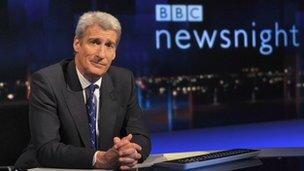Jeremy Paxman criticises David Cameron's WWI comments
- Published
David Cameron: "Our duty towards these commemorations is clear. To honour those who served"
Newsnight presenter Jeremy Paxman has criticised the prime minister for comments he made about how Britain will mark the centenary of World War I.
David Cameron said he wanted to see a "commemoration that, like the Diamond Jubilee celebrations, says something about who we are as a people".
Paxman told the Radio Times that centenary events should "have almost nothing in common" with the Jubilee.
He spoke of concerns the centenary could become a "celebration of war".
Mr Cameron's comments were made in a speech, external at the Imperial War Museum in London in October last year.
He promised a "truly national commemoration" to mark 100 years since the outbreak of war - in 2014, Armistice Day in 2018, and the dates of major battles in between.
Paxman, whose great uncle died in the war, said that "not to acknowledge the war's significance would be wilful myopia", but that "the whole catastrophe has been overlain with myth and legend".

Paxman said others were also worried that the commemoration would turn into a celebration
But the 63-year-old, who also presents University Challenge, said the Jubilee was "an excuse for a knees-up in the rain to celebrate the happy fact that our national identity is expressed through a family rather than some politician who wants the job to gratify his vanity".
"A number of distinguished fellow citizens, like the poet laureate Carol Ann Duffy and the thoughtful musician Brian Eno, are worried that the events will turn into a celebration of war. Only a moron would 'celebrate' the war," he added.
He added: "We shouldn't 'celebrate' the outbreak of the First World War. But not to recognise that it was one of the most consequential events in our history would just be perverse."
The prime minister used the speech to announce that more than £50m has been allocated for a "historic" commemoration of World War I.
- Published11 October 2012
- Published3 October 2013
- Published13 August 2013